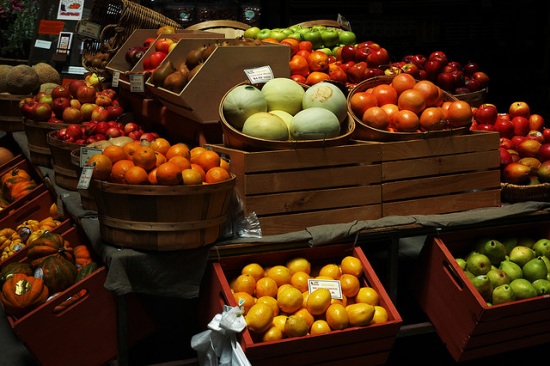Cash strapped consumers have been dealt a further blow this week, after it was revealed the cost of fruit and vegetables has soared by more than 50 per cent this year. This is due to heavy rain devastating crops in what has proven to be the wettest summer in a century.

However, the problems for supermarket customers do not end in the fruit and veg aisle. Wheat harvests, both in the UK and abroad, have been affected by bad weather, pushing up the prices of items such as bread and pasta, while increasing costs of animal feed mean that milk, pork, chicken and beef are soon to follow in this mammoth price increase.
While the wet weather has been the root cause of the problem in the UK, droughts covering large areas of the United States and Russia mean that British retailers cannot even rely on foreign imports to keep the costs down for products such as corn and soya.
A survey by price comparison website Moneysupermarket.com has revealed exactly what the mounting cost of healthy options is doing to the average family’s weekly shopping budget. At Asda, the price of a 2.5kg pack of Maris Piper potatoes has doubled from £1 to £2 since October 2011, while British Gala Apples have seen a 70 per cent price increase in the same period.
Tesco is also failing to keep costs down, with a 50 per cent price increase on loose carrots bumping the price up to 90 pence per kilo.
Even Sainsbury’s, which is fast becoming the nation’s favourite supermarket and has recently posted outstanding second quarter results, is struggling to help customers stick to their budgets. Conference pears have been bumped up to 39 pence each, with Royal Gala apples following suit with a 19 per cent price rise.
Food director at the British Retail Consortium, Andrew Opie, insists that retailers are doing everything in their power to cushion consumers from the worst of the price rises.
He says; “Retailers are doing a lot to keep fruit and veg affordable, from running record numbers of promotions to putting more produce into their basic ranges.”
However, it appears that families are still struggling to afford the increasing prices, with their diets suffering as a result. In a study by the Department for Environment, Food and Rural Affairs (DEFRA), it was found that the poorest 10 per cent of households now buy 25 per cent less food than they did in 2007 – before the recession and inflation began to take their toll on family food bills. Vegetable consumption has also fallen by 15 per cent in the same time frame, indicating a need to lower the cost of healthy options.
Yet it is not only consumers who are feeling the pinch as a result of the washout summer – farmers are now facing the hardship of feeding their animals over the winter with less revenue from crops sales in the summer. Something which will make this job much harder is the fact that the cost of animal feed is on the rise, again due to the poor harvests this year.
In fact, the issue has become so severe that the National Farmers’ Union is concerned that many of its members will cease to trade in chicken and pig production, simply because the rise in feed costs will mean it will no longer make them any profit.
President of the NFU, Peter Kendall, says; “It has been soul destroying for the farmers growing the crops.
“The challenge for the pig and poultry market is to make sure retailers pay a fair price, because in pigs 50 per cent of the cost is grain, while in poultry it is 60 per cent.
“These farmers at the moment – because the prices haven’t responded yet – they’re saying ‘I’m not going to fill my sheds with poultry or pigs any more.’”
Of course it is only natural that, as the price of animal feed rises, so will the cost of animal products such as milk, eggs, pork and chicken. Yet with the average family’s budget already stretched to breaking point with the increases on fruit and vegetables, the question is whether some households will begin sacrificing a healthy diet for an affordable weekly shop.
Are you struggling to maintain a healthy diet due to the price increases hitting supermarket shelves this autumn? Would you eat less fruit and vegetables to get more for your money, or do you think a balanced diet is worth the extra cost?